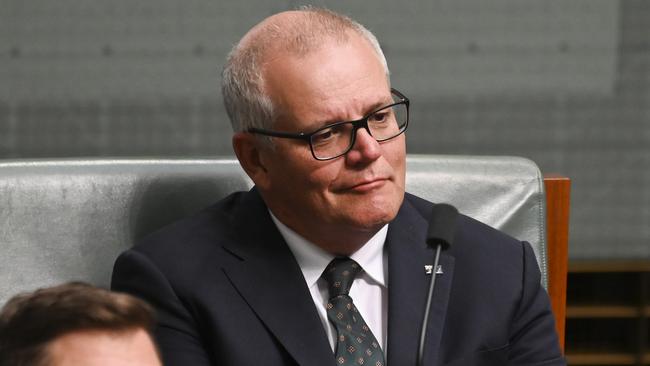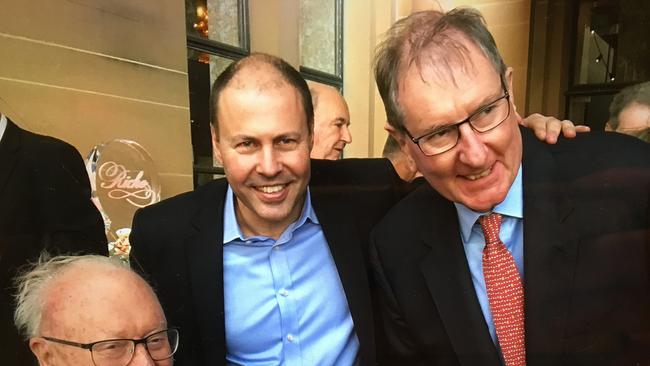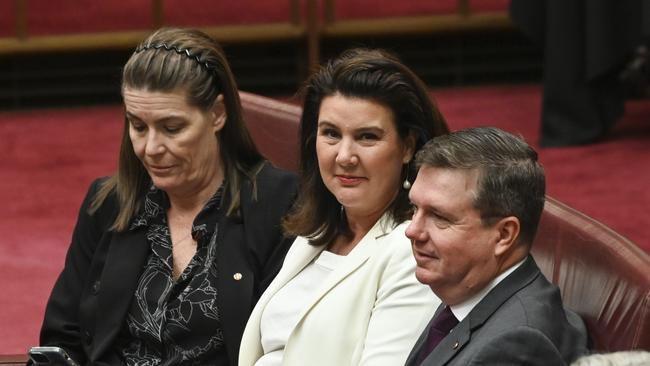Liberals must change culture to win: Dan Tehan
Dan Tehan claims the Coalition can’t win the next election until Libs reform from the grassroots up, as review into the election loss will reveal divisions within the party.

Senior Liberal frontbencher Dan Tehan has called for wholesale cultural change within the party, claiming the Coalition could not win the next election until it reformed from the grassroots up.
A post-election review to be handed to the party’s federal executive this week will deliver a damning assessment of the State Liberal party divisions, claiming that they no longer represented modern Australia.
Mr Tehan, the shadow minister for immigration, said it was vital the party adopted the recommendations of the review. It will also recommend the need for more women and greater ethnic representation.
“Well, what the review shows is that we’ve got to make sure that we’re doing that outreach, doing that engagement and ensuring that we are in touch with modern Australia,” he said.
“ … I think we can change the culture in the coming months, in the coming years, and we will change the culture in the lead up to the next election — we have to.
“If we are to win at the next election, we have to change the culture immediately.
“We’ve got preselections coming up over the next 12 to 18 months so we’ve just got to make sure we now begin to implement.”
“Every political movement has to make sure that they are continuing to update their systems, modernise their practise, and in putting all the latest techniques in place to make sure that they‘re engaged.
“ … the absolute key now, is that we adopt the recommendations and make sure we implement them.”
“Plenty of reviews are done. They have the greatest intention in the world, but then they’re left on a shelf to get dusty.
Former Wentworth MP Dave Sharma says the Liberal Party must “win back” voters who abandoned them at the election by “addressing and neutralising some of the obvious issues that made them vote teal in the first place”.
Mr Sharma said the party, which lost a swathe of Sydney and Melbourne metropolitan seats to Climate 200-backed teal independents at the May election, said it was wrong to dismiss traditional Liberal voters as being “entirely lost to us”.
The 46-year-old, who was defeated by teal independent Allegra Spender after a 6.96 per cent swing against him in Sydney’s eastern suburbs, said if the Liberal Party can’t find a way to win back seats like Wentworth, North Sydney, Mackellar, Goldstein and Kooyong that “ultimately means we have no pathway back to government”.
“The challenge is for us to win back these Liberal defectors and to rebuild our primary. No, we are not going to be able to ‘out-teal’ the teal candidate. We don’t need to do so — we don’t need to win back the Labor and Greens supporters who tactically voted teal,” Mr Sharma told The Australian.
“But we do need to find a way to win the naturally Liberal voters who turned teal back, and that means addressing and neutralising some of the obvious issues that made them vote teal in the first place.
“Disregarding or dismissing these voters as entirely lost to us will mean we will not be in a position to win these seats back, and that ultimately means we have no pathway back to government.”
Mr Sharma, a former ambassador to Israel who senior Liberals hope will return to the parliament, rejected comparisons between House of Representative and Senate primary votes.
“The successful teal candidates bundled together Labor, Greens and some Liberal votes. There was no teal candidate in the Senate to vote for. So of course these votes went back to their natural homes, which meant the vote for Labor, Liberal and Greens in the Senate in all these seats was higher,” he said.
Mr Sharma, a member of the Liberal moderate faction, said: “Saying ‘the party brand outperformed the sitting MPs’ is utterly incorrect in this context — it’s comparing apples with oranges.
“In Wentworth, the Greens took 20.5 per cent primary in the Senate but only 8.3 per cent in the House vote. For Labor it was 22.7 per cent vs 10.8 per cent. For the Libs it was 42.9 per cent vs 40.5 per cent.”
Analysis obtained by The Australian showed that in other lost Liberal seats, including North Sydney, Mackellar and Goldstein, the swing against the party in the Senate was in some cases around half of the swing against incumbent MPs.
Mr Sharma said “the obvious marker here is the overall swing”.
“In 2019 in Wentworth the Libs took 49.2 per cent of the Senate primary vote. In 2022 we managed only 42.9 per cent — so a swing against us of 6.3 per cent. The swing against me in the House was much the same — I lost 6.5 per cent of my primary vote. The fate of the sitting MPs in fact matched that of the party brand — hardly surprising.”
Former Goldstein MP Tim Wilson, who lost his Melbourne seat to teal independent Zoe Daniel, said “the delusion is that seats that turned teal will just come back, when half the reason they fell was the absence of a clear Liberal economic reform program and narrative.
“In 2022 we announced our core policy platform one week out from an election when we should have salivated for an entire election fought on the primacy of home ownership to Australians,” Mr Wilson told The Australian.
“We had the same problems in 2019, the difference is we reminded one million Australians who would have been pushed down the financial stairs by Labor’s retiree tax to hold, but in 2022 we did it too late.”
Grassroots collapse
The Australian understands that a key finding of the report is that the grassroots of the party had collapsed amid a failure to reflect local communities.
Too many states were now also controlled by factional arrangements, were being ruled by personality cults and fiefdoms with little incentives to change because of the fear of losing internal power.
It is understood that a key recommendation in the review – led by former Liberal Party federal director Brian Loughnane and opposition finance spokeswoman Jane Hume – will be to break the stranglehold of those in control of the state divisions.
While the review acknowledges the unpopularity of Scott Morrison as a key factor in the election loss, it has reserved its most scathing assessment for the performance of the state divisions.

It will also recommend the need for more women and greater ethnic representation amid concerns that the party no longer represented modern Australia.
The review, which was launched on May 26 and has received hundreds of submissions, is believed to have rejected the call for quotas for women but will set targets for greater representation.
The report is expected to be particularly scathing of the NSW division and the dysfunctional preselection process, with factional infighting delaying some candidate selection until the eve of the election, severely eroding the party’s ability to campaign in NSW where it ultimately lost seats.
This was an enduring problem, with the Perrottet government facing a similar issue with candidates for some key seats still to be decided ahead of the March 2023 state election.
The Australian understands the review is equally critical of the Victorian division, which has failed to renew, presided over a very narrow party base and was dominated by personality cults in the organisational wing.
It is highly critical of the calibre of candidates being put up for preselection, including the lack of women and ethnic diversity, as a symptom of the cultural decay of the divisions.
Ahead of the review’s release, new analysis obtained by The Australian reveals that thousands of voters in seats won by Climate 200-backed teal independents strongly supported the Liberal Party in the Senate but abandoned incumbent Liberal MPs.

The analysis also shows that disillusioned Australians who voted for minor parties, including United Australia Party, One Nation and the Liberal Democrats, preferenced teals ahead of sitting MPs, helping the independents push ahead on the two-party preferred vote.
It reveals that in some teal seats, the swing against sitting MPs was “twice as high” compared with swings against the Liberal Party in the Senate.
A breakdown of Australian Electoral Commission data shows that in traditional Liberal Party seats, including Mackellar, Curtin and North Sydney, between 3400 and 4000 voters gave the Liberals top spot on their Senate ballot papers but did not vote for incumbent MPs in the House of Representatives.
The trend was repeated on a smaller scale in Goldstein (2839 votes) and Wentworth (1817 votes). In Kooyong, where former treasurer Josh Frydenberg was ousted by Monique Ryan, the margin between Senate and House of Representatives primary votes was 409.
As Liberal strategists consider how to win back teal seats in 2025, senior Coalition sources said incumbent MPs who attempted to compete with independents on climate change and other progressive issues had failed to cut through.
“If you look at the higher number of voters who picked the Liberal Party in the Senate, the party brand outperformed the sitting MPs,” a source said.
“Moving forward, they’ll be looking at how to pull back the teal vote. And that won’t happen by trying to match the teals.
“We’ve seen it in the past where people who tried to be like One Nation actually drove up the One Nation vote.”
With preference flows from some disaffected voters not returning to Liberal MPs, another source said “we need to look at how we address those voters”.
“While One Nation and UAP don’t vote high in those teal seats, we’re still talking around 3 to 4 per cent of the vote. If you’re losing half of that to teals, it makes it much more difficult.”
Despite Labor only winning 32.6 per cent of the primary vote, the Coalition was decimated after losing seats in Brisbane, Sydney, Melbourne and Perth to teal independents and the Greens. In an electoral bloodbath, the ALP, Greens and teals claimed Liberal seats including Curtin, Goldstein, Kooyong, Higgins, North Sydney, Mackellar, Ryan, Brisbane, Boothby, Hasluck, Robertson, Swan, Tangney and Bennelong.







To join the conversation, please log in. Don't have an account? Register
Join the conversation, you are commenting as Logout